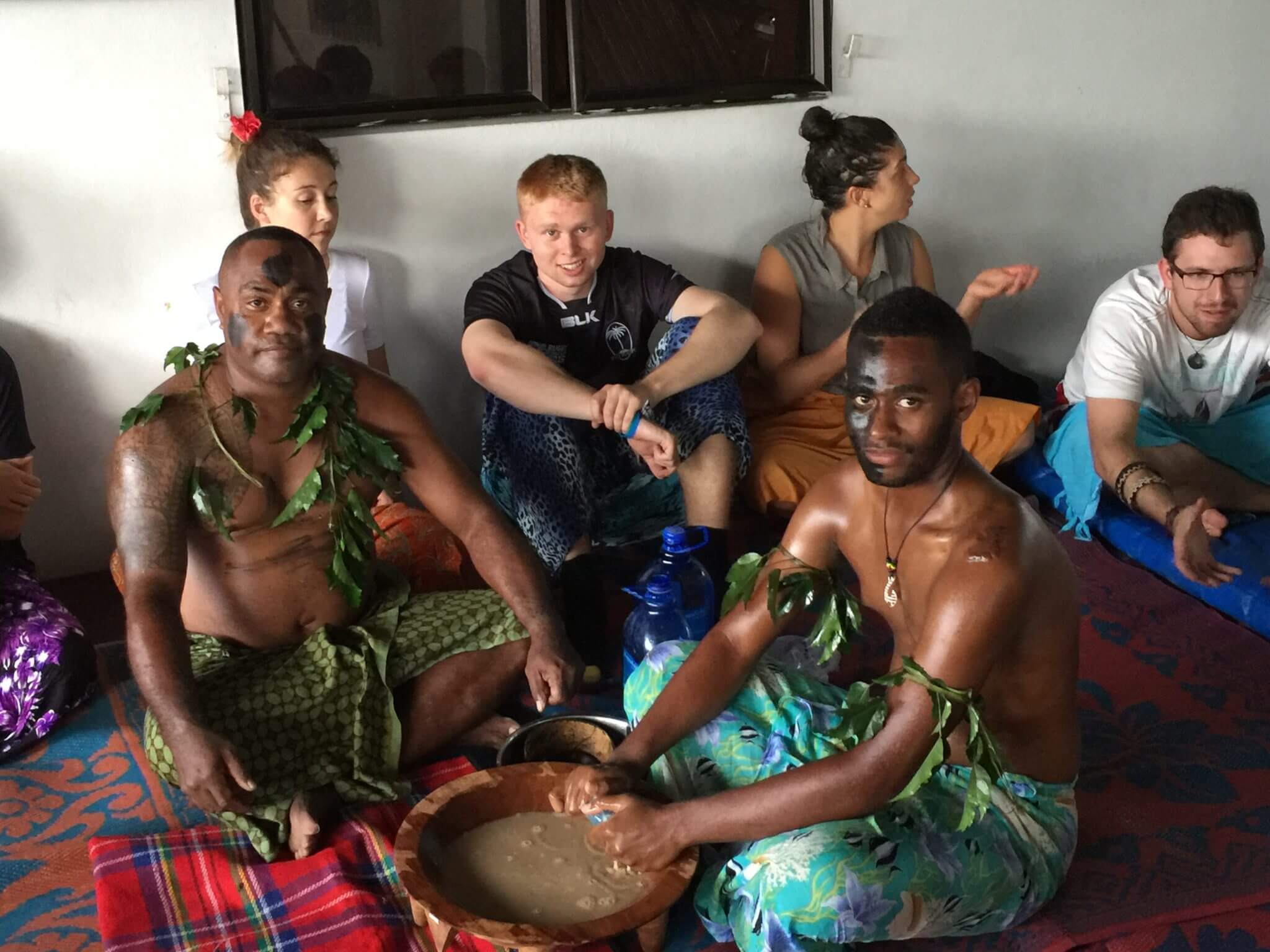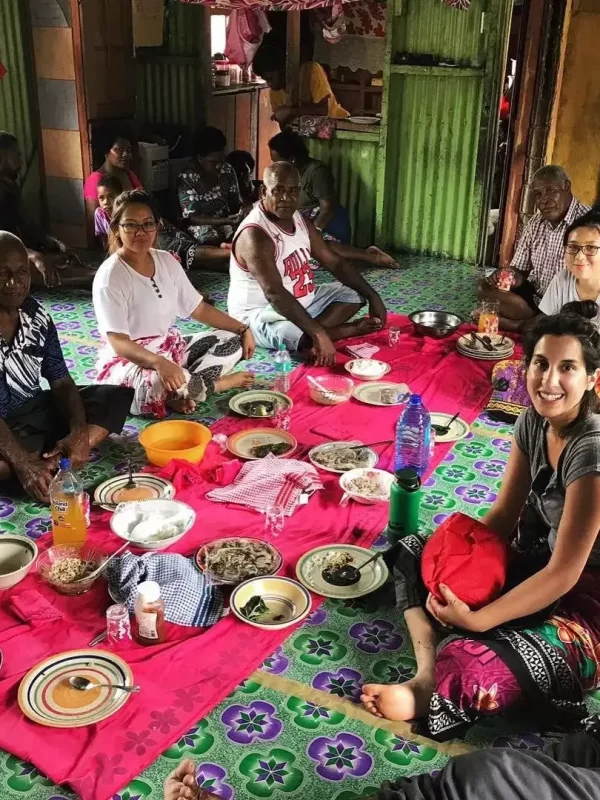Following up from our previous posts about IVI’s nutrition projects in Fiji, Jules Galloway (IVI’s Fiji Nutrition Coordinator) explains more about where the volunteers stay over in Fiji. Listen to the podcast clip or read on! …
FYI: You don’t have to be qualifed to take part in our nutrition projects, as long as you are a student of medicine, nutrition, physiotherapy, naturopathy, dietetics and anything else related, you can take part!
You might be wondering where we stay when we’re over there, and what life is like for a volunteer. Generally speaking, the volunteer will work with local Fijian families, so we will stay with a local family and live like a Fijian. It’s actually really cool, we get welcomed into these families, it’s really beautiful and we get amazing Fijian food, like slow cooked meat and veggie dishes. Heaps of seafood, lots of curries because of the Indian influence in Fiji, there’s lots of Indo-Fijian people there. The local foods amazing, yes, HUGE servings but lots of carbs as well so, you know I’ve gone over to Fiji and come home 2 kilos heavier in the past, I have to watch it now! I’ve developed a bit of a taste for cassava, taro and all that sort of stuff.
There are some beautiful local Fijian dishes, if you’re ever in Fiji, eat something called Kokoda, it’s a beautiful raw fish dish, that’s cured in a lime juice and coconut milk. Amazing food, occasionally we’ll even be served something called lovo. Last time, a coupe of trips ago, we even made a lovo, so that’s like a big oven in the ground where there’s a fire, and they turn it into the hot coals and you bury the food on the hot coals for several hours. It’s this beautiful slow cooked meat and veggies.
Unfortunately, on the flip side of that, the typical Fijian diet is waaaay too much white bread, way too much sugar, way too many empty carbs and margarine! Oh my god, I’ve never seen so much margarine for sale! It reminded me of growing up in the 1980’s, it was like white bread, empty carbs, breakfast cereals, margarine, I’m like, I feel like its 30 years ago (and we all know how that works out). Even the sugar, you can’t buy a small bag of sugar, you can only get MASSIVE bags of sugar.
When we were doing that exercise where we were putting the sugar into the zip lock bags, we had to buy a whole kilo of sugar! We couldn’t find a smaller bag of sugar, it was crazy. So yeah, there’s a lot of challenges over there with the local diet. The traditional Fijian diet was all meat, fish, veg and fruit, but unfortunately now look what’s happened to them, hence the diabetes, I guess.
So we stay with the Fijian families, we get to see what they eat, occasionally, if we’re really lucky, we might get to spend a night at one of the resorts we’re working with, which is awesome! But honestly, the families now feel more like home to me, when I go there, they all say “hello, you’re home now, you’re home”. When you feel like you’re invited n, you really feel like you’re part of the family.
Sometimes we get to stay in villages, on islands, which is really cool. Very simple, very basic accommodation, like sitting on a mat on the floor but it’s just heaven, it really is. You wake up in the morning and you look out your window, and there’s the ocean, which looks like a postcard, it’s crazy good. It’s a really beautiful place on earth.
Like I keep saying, the people are the nicest, warming, welcoming people in the world. It’s really easy to feel at ease over there and that’s one of the reasons I feel so passionate about helping and why I keep going back.
Side note– If you ever get the chance to sit on the floor and drink kava and be with the locals for a night and absorb that Fijian way of life- Do it! There’s a lot you can learn from hanging out in Fiji, I’ll tell you what, a slow life, simple life, lots of late-night chats, less TV, less social media, sometimes you sit around and sing songs! It’s a beautiful slow, wonderful way of life, I love it.
Interview of a volunteer in Fiji
Now, I wanted to give you a bit of an insight of what its like to be a volunteer. I’ve given you a bit of insight on what its like to be the volunteer coordinator, but I have lots of amazing volunteers, quite often young, still students, or maybe just about the graduate from Uni in their health course. Quite often they’re a bit microphone shy! But I managed to nail down one of them for a quick interview, so have a listen to this. Her names Marina and she’s studying to be a dietician. Here’s what she had to say about her experience in Fiji.
Can you tell me a little bit about why you decided to come volunteering with IVI?
“Yeah, well I was just looking in my break, I guess between Uni, to have a bit more experience, maybe abroad. I knew that in Australia volunteering is really hard to find, and they sort of want you to stick with them for the rest of your life! So, I’d thought that I’d go to Fiji, which I just found online, to see what experience I could get after Uni, because I haven’t finished studying yet. So it’s been really good!”
And what are you studying to be right now?
“I am studying dietetics, so everything to do with nutrition. I hope to go on to private practice, but who knows! I need to get the experience before that!
What did you learn coming to Fiji? What sort of things surprised you?
“I think their lifestyle surprised me the most. The whole, ‘everything’s chill, everything’s fine’ and adjusting to that. I’m a pretty punctual, reliable, on time person, so coming here was a definite change! But I think I’ve learnt to adapt, and that’s a skill, I guess.”
She’s on Fiji time now! Throw your watch out the window believe me! And what skills have you learnt while you’re here?
“Well, I had no idea how to do manual BP, so blood pressure, glucose test, even though I learnt a lot about that in Uni, I’d never learnt how to take any. So that’s a really good skill to have, especially clinically. And yeh, just how to talk to people as well, talk in a more simple language to what I am used to, has also been really good to learn.”
I think simplifying stuff is a skill we can take back with us to Australia as well.
“Exactly, there’s a lot of different populations and people we have to cater to, so I think it’s very important.”
Awesome. What’s been your biggest take-away that you think you’ll go back to Australia with from this experience?
“I think my biggest takeaway would be that if you speak to a person the right way, they will be open to your advice, because they understand what you’re saying. So even here, I’ve learnt that Fijians are actually very open to advice. They’re sort of like “Oh! I didn’t know that; I’ll try and do that”. I think you just have to learn how to get your message across.”
What advice would you have for anyone thinking of doing any sort of volunteering in Fiji?
“If you’re thinking about it, I would just do it! You don’t need to have any very special skills, if you have an interest in health or anything like that. Just do it because you’ll learn on the spot and you’ll learn pretty quick.”
Do you think you grow as a person as well?
“Definitely! I think I’ve learnt so much, especially being with the other volunteers as well. They’ve got other skills that they bring to the table. Also being with people who are older than me, who have more experience, clinically as well. That’s been really good.”
Thank you so much for being on podcast Marina, you’re a legend and I’ve really loved having you on our team!
“Thanks for having me, it’s been great!”
For more info: Nutrition & Public Health Projects
Check out these 2 NEW nutrition projects too: Bali Nutrition Outreach and Public Health in Peru
 Involvement Volunteers International
Involvement Volunteers International 



Sneha says:
Hi, is there any chance we could part take as volunteers , I’m currently a year 2 dietetics student
Sam says:
Hi Sneha,
Yes of course! You can apply here: https://volunteering.org.au/application/ 🙂